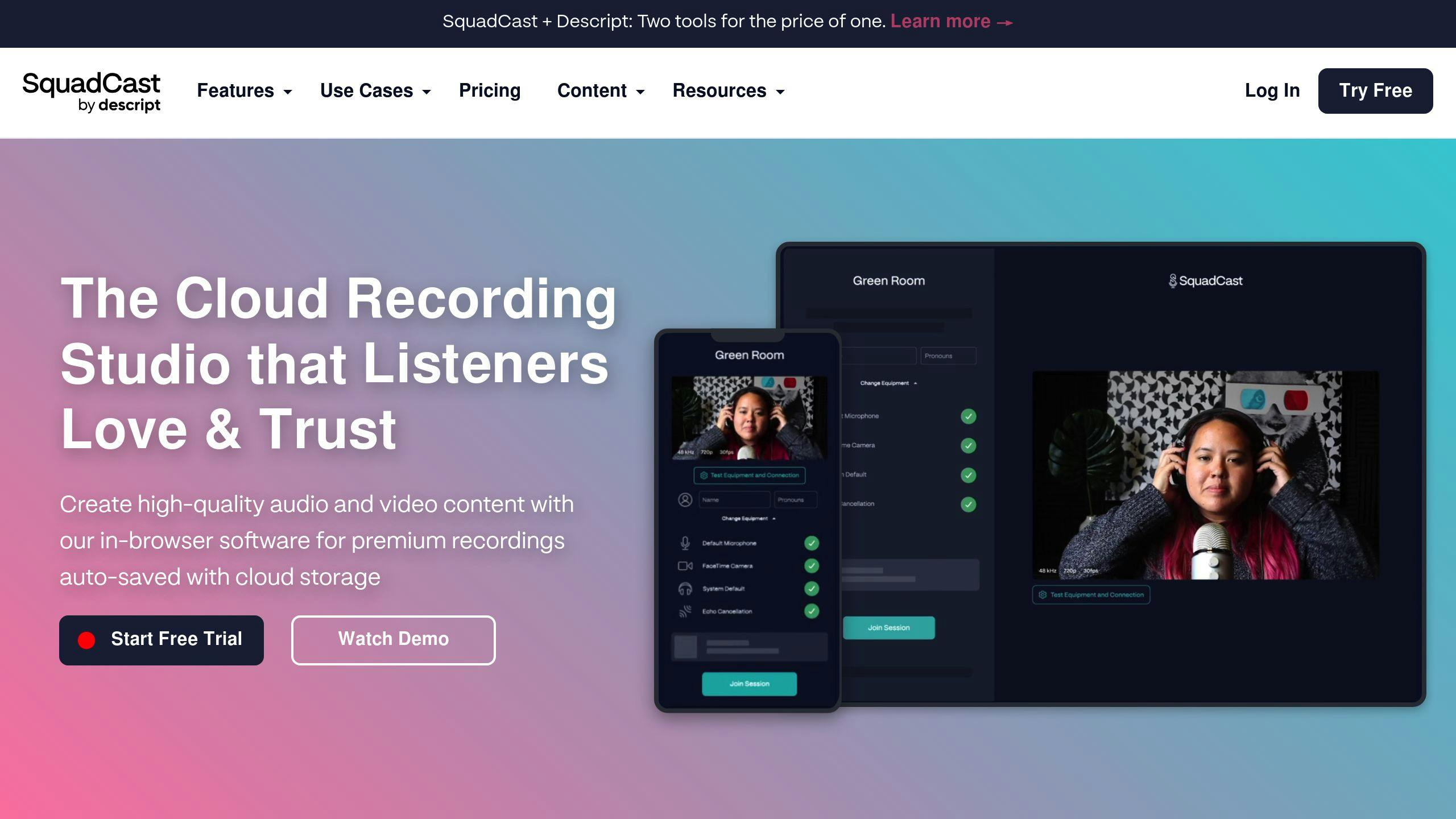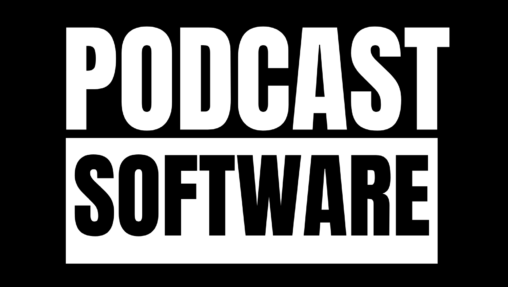- Top Tools: SquadCast, Zencastr, and Alitu are leading platforms for remote podcast teams.
- Key Features:
- Local recording for high-quality audio.
- Real-time communication to reduce delays.
- Security features like encryption to protect content.
- Integration with hosting platforms for seamless workflows.
- Quick Comparison:
- SquadCast: Reliable for live sessions, $15/month.
- Zencastr: Great for post-production, $20/month.
- Alitu: Simplifies editing and hosting, $38/month.
These tools make remote podcasting easier by solving connectivity issues, improving audio quality, and automating tedious tasks. Choose based on your team’s needs, whether it’s collaboration, editing, or distribution.
Features to Consider in Real-Time Collaboration Tools
Low Latency and High-Quality Audio/Video
When working on remote podcast production, having tools with low latency is key. It keeps conversations natural and ensures smooth interactions between team members. Delays in audio or video can lead to awkward pauses, which can hurt the overall quality of your podcast.
For instance, Riverside.fm uses local recording and progressive uploads to deliver professional-quality recordings, even when the internet connection is shaky [4]. While audio and video quality are non-negotiable, the tool’s ease of use plays a big role in how effective it is for your team.
User-Friendly and Accessible
Collaboration tools should be easy to use, even for team members who aren’t tech-savvy. For example, SquadCast simplifies the process with features like automatic equipment detection, which helps avoid common technical hiccups during recording sessions [1].
A good collaboration tool should include:
| Feature | Benefit |
|---|---|
| One-click joining | Saves time and simplifies guest setup |
| Equipment detection | Reduces audio setup errors |
| Real-time status indicators | Keeps everyone informed during recording |
| Cross-platform compatibility | Allows access from different devices |
While usability is a top priority, don’t overlook the importance of integration and security for a smooth and secure production process.
Integration and Security
For remote podcast teams, integration and security are must-haves. These features not only streamline collaboration but also protect your content during production. SquadCast, for example, uses encryption for all audio, video, and data transmissions to ensure security [1].
Additionally, tools like Alitu connect directly with hosting platforms, making workflows more efficient and cutting down the need to jump between multiple tools [5][6]. This integration saves time and keeps the production process organized.
Best Real-Time Collaboration Tools for Remote Podcast Teams
SquadCast

SquadCast focuses on delivering high-quality remote recording, even for teams with unreliable internet connections. It records each participant’s audio locally on separate tracks, ensuring top-notch sound quality and reducing the risk of glitches during the session [4]. Features like screen sharing, active speaker detection, and VU meter monitoring make it a solid choice for professional podcast production [1].
One standout feature is its real-time, progressive uploads. This ensures your recordings are safe from data loss, even if the internet connection drops during a session [1].
If your team prioritizes seamless recording during live sessions, SquadCast is hard to beat.
Zencastr

Zencastr is all about post-production ease and studio-quality sound. Its local recording system ensures audio quality isn’t affected by internet issues, while advanced tools like automatic audio leveling and customizable intros/outros simplify editing [3].
Here are some key features:
| Feature | Benefit |
|---|---|
| Local Recording | Ensures consistent quality regardless of connection |
| Automatic Post-Production | Speeds up editing with built-in audio processing |
| Separate Track Recording | Allows for detailed, precise edits |
Zencastr also provides secure cloud backups, so you never have to worry about losing your work.
Alitu

Alitu is designed for simplicity and automation, making it ideal for teams who want to focus on creativity rather than technical details. It handles audio cleanup, integrates hosting, and streamlines distribution to platforms like Apple Podcasts and Spotify [5]. Its straightforward interface ensures accessibility for teams of all skill levels, while automated tools maintain consistent audio quality across episodes.
If your team values ease of use and automation, Alitu might be the perfect fit.
Each tool brings something different to the table, so take some time to weigh their features and choose the one that aligns best with your team’s needs.
sbb-itb-9f49a8d
The BEST Podcast Recording Software
Comparison of Real-Time Collaboration Tools
Here’s a side-by-side look at popular tools to help you decide which one fits your team’s needs.
Comparison Table
| Tool | Ease of Use | Audio/Video Quality | Integration | Monthly Cost | Key Features |
|---|---|---|---|---|---|
| SquadCast | High | Excellent | Good | From $15 | Local recording, Progressive uploads, VU meter monitoring |
| Zencastr | Medium | Excellent | Good | From $20 | Automatic post-production, Cloud backups, Lossless quality |
| Alitu | High | Very Good | Excellent | From $38 | Built-in hosting, Automated editing, Platform distribution |
Each tool brings something different to the table. SquadCast is known for its reliability, thanks to its progressive upload feature. This ensures your recordings are safe, even if your connection drops mid-session [1]. It’s a great choice for teams working across time zones or with spotty internet.
Zencastr leans into technical features. Its top-notch audio quality and cloud backups are ideal for those seeking polished production. Tools like automatic audio leveling can also save a lot of editing time [3].
Alitu focuses on simplicity and integration. Its user-friendly interface and features like direct distribution to podcast platforms make it a great option for teams looking to avoid technical hassles [5].
Key Considerations
- Audio Processing: SquadCast and Zencastr offer local recording, ensuring high-quality audio. Alitu, on the other hand, simplifies things with automated cleanup tools [4].
- Collaboration Features: SquadCast supports real-time interaction, while Zencastr offers more control during post-production [1][3].
- Integration: Alitu shines here, making it easy to connect with hosting platforms and streamline distribution [5].
Pricing varies depending on your needs. SquadCast and Zencastr are more budget-friendly for basic plans, while Alitu’s higher price includes hosting and automated editing, potentially saving on extra subscriptions [4][5].
Choosing the right tool depends on your podcasting workflow. Think about your team’s priorities – whether it’s real-time collaboration, audio quality, or seamless platform integration – to make the best decision.
Conclusion and Tool Recommendations
SquadCast’s progressive upload feature ensures recordings remain uninterrupted, even for remote teams facing connectivity problems [1]. Its ability to maintain performance under tough network conditions makes it a strong option for professional podcast creators.
Zencastr stands out with features like automatic post-production and lossless audio, saving time for teams with tight schedules [3]. These tools are especially helpful for groups producing multiple episodes each week.
Alitu offers an all-in-one solution with built-in hosting and automated editing, perfect for teams looking to streamline their process [5]. While its $38 monthly starting price may seem high, it can actually cut costs by replacing the need for multiple subscriptions.
When choosing the right tool, keep these factors in mind to ensure it fits seamlessly into your workflow:
- Pick a tool that aligns with your team’s technical expertise and recording needs.
- Weigh subscription costs against potential savings from bundled features.
- Check how well the tool integrates into your current processes.
Testing a tool over 2–3 episodes can provide clarity and help you make a smart, long-term decision [2]. For detailed reviews and comparisons of podcast tools, including hosting, editing, and distribution options, visit Podcastsoftware.co.

